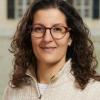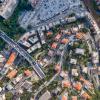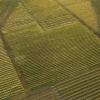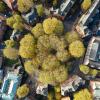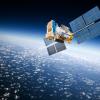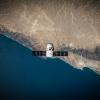
NODES will mobilize the tools of citizen and data science combined with Earth observations to monitor, analyze, and foster progress towards the UN Sustainable Development Goals (SDGs).
To realize this vision, NODES will exploit novel data ecosystems in which several actors interact via infrastructure, analytics, and applications to produce, analyze, exchange, and consume data.
Three main cross-fertilizing pillars characterize the research focus of NODES:
- Advancing the field of citizen science: NODES will remain at the forefront of citizen science from conceptual advancements to innovations in citizen science practice, including the development of new means to acquire, analyze, and openly share citizen science data, as well as how citizen science can contribute to the SDGs and sustainability.
- Enriching Earth observation: NODES will utilize new types of Earth observation technology (e.g., high-resolution imagery, drones, and the Internet of things (IoT)) and develop applications that focus on the interplay between Earth observation and citizen science using Geo-Wiki tools, various forms of remote sensing, and on-site observation.
- Exploiting the digital revolution: NODES will harness the opportunities arising from the digital revolution by exploiting advancements in computing capabilities, data science (e.g., machine and deep learning), environmental informatics, and the geospatial sciences, among others, to enhance integrated systems science research and generate new and innovative data sets for further insights.
Projects
Staff
News
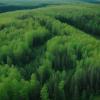
17 July 2024
Forests endure as carbon sink despite regional pressures
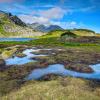
01 July 2024
What do we need for better biodiversity monitoring in Europe?

26 June 2024
Jan Steinhauser in an interview for the ‘Climate Survivors’ game
Events
Focus
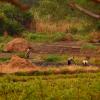
08 July 2024
Future food demand in The Gambia: can increased crop productivity and climate adaptation close the supply–demand gap?
The Gambia faces significant food availability issues due to low agricultural productivity. IIASA researchers and colleagues used the FABLE Calculator to explore actions to reduce the food supply-demand gap by 2050. The results, published in Food Security, reveal that current cropland will not meet food demand by 2050.
27 June 2024
Improving national SDG reporting through citizen science
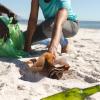
Publications
Barthelme, P., Darbyshire, E., Spracklen, D.V., & Watmough, G. (2024). Detecting Vietnam War bomb craters in declassified historical KH-9 satellite imagery. Science of Remote Sensing 10 e100143. 10.1016/j.srs.2024.100143. Xu, P., Tsendbazar, N.-E., Herold, M., de Bruin, S., Koopmans, M., Birch, T., Carter, S., Fritz, S. , Lesiv, M. , Mazur, E., Pickens, A., Potapov, P., Stolle, F., Tyukavina, A., Van De Kerchove, R., & Zanaga, D. (2024). Comparative validation of recent 10 m-resolution global land cover maps. Remote Sensing of Environment 311 e114316. 10.1016/j.rse.2024.114316. Hordijk, I., Bialic‐Murphy, L., Lauber, T., Routh, D., Poorter, L., Rivers, M., ter Steege, H., Liang, J., Reich, P., de‐Miguel, S., Nabuurs, G.-J., Gamarra, J., Chen, H., Zhou, M., Wiser, S., Pretzsch, H., Paquette, A., Picard, N., Hérault, B., Bastin, J.-F., Alberti, G., Abegg, M., Adou Yao, Y., Almeyda Zambrano, A., Alvarado, B., Alvarez‐Davila, E., Alvarez‐Loayza, P., Alves, L., Ammer, C., Antón‐Fernández, C., Araujo‐Murakami, A., Arroyo, L., Avitabile, V., Aymard Corredor, G., Baker, T., Banki, O., Barroso, J., Bastian, M., Birigazzi, L., Birnbaum, P., Bitariho, R., Boeckx, P., Bongers, F., Bouriaud, O., Brancalion, P., Brandl, S., Brienen, R., Broadbent, E., Bruelheide, H., Bussotti, F., Gatti, R., Cesar, R., Cesljar, G., Chazdon, R., Chisholm, C., Cienciala, E., Clark, C., Clar, D., Colletta, G., Coomes, D., Valverde, F., Corral‐Rivas, J., Crim, P., Cumming, J., Dayanandan, S., de Gasper, A., Decuyper, M., Derroire, G., DeVries, B., Djordjevic, I., Iêda, A., Dourdain, A., Dolezal, J., Obiang, N., Enquist, B., Eyre, T., Fandohan, A., Fayle, T., Ferreira, L., Feldpausch, T., Finér, L., Fischer, M., Fletcher, C., Frizzera, L., Gianelle, D., Glick, H., Harris, D., Hector, A., Hemp, A., Hengeveld, G., Herbohn, J., Hillers, A., Honorio Coronado, E., Hui, C., Cho, H., Ibanez, T., Jung, I., Imai, N., Jagodzinski, A., Jaroszewicz, B., Johannsen, V., Joly, C., Jucker, T., Karminov, V., Kartawinata, K., Kearsley, E., Kenfack, D., Kennard, D., Kepfer‐Rojas, S., Keppel, G., Khan, M., Killeen, T., Kim, H., Kitayama, K., Köhl, M., Korjus, H., Kraxner, F., Laarmann, D., Lang, M., Lewis, S., Lu, H., Lukina, N., Maitner, B., Malhi, Y., Marcon, E., Marimon, B., Marimon‐Junior, B., Marshall, A., Martin, E., Martynenko, O., Meave, J., Melo‐Cruz, O., Mendoza, C., Merow, C., Miscicki, S., Mendoza, A., Moreno, V., Mukul, S., Mundhenk, P., Nava‐Miranda, M., Neill, D., Neldner, V., Nevenic, R., Ngugi, M., Niklaus, P., Oleksyn, J., Ontikov, P., Ortiz‐Malavasi, E., Pan, Y., Parada‐Gutierrez, A., Parfenova, E., Park, M., Parren, M., Parthasarathy, N., Peri, P., Pfautsch, S., Phillips, O., Piedade, M., Piotto, D., Pitman, N., Polo, I., Poulsen, A., Poulsen, J., Arevalo, F., Restrepo‐Correa, Z., Rodeghiero, M., Rolim, S., Roopsind, A., Rovero, F., Rutishauser, E., Saikia, P., Salas‐Eljatib, C., Schall, P., Shchepashchenko, D. , Scherer‐Lorenzen, M., Schmid, B., Schöngart, J., Searle, E., Seben, V., Serra‐Diaz, J., Sheil, D., Shvidenko, A., Silva‐Espejo, J., Silveira, M., Singh, J., Sist, P., Slik, F., Sonké, B., Souza, A., Stereńczak, K., Svenning, J.-C., Svoboda, M., Swanepoel, B., Targhetta, N., Tchebakova, N., Thomas, R., Tikhonova, E., Umunay, P., Usoltsev, V., Valencia, R., Valladares, F., van der Plas, F., Van Do, T., Van Nuland, M., Martinez, R., Verbeeck, H., Viana, H., Vibrans, A., Vieira, S., von Gadow, K., Wang, H.-F., Watson, J., Werner, G., Wittmann, F., Wortel, V., Zagt, R., Zawila‐Niedzwiecki, T., Zhang, C., Zhao, X., Zhu, Z.-X., Zo‐Bi, I., Maynard, D., & Crowther, T. (2024). Dominance and rarity in tree communities across the globe: Patterns, predictors and threats. Global Ecology and Biogeography ee13889. 10.1111/geb.13889. Pan, Y., Birdsey, R.A., Phillips, O.L., Houghton, R.A., Fang, J., Kauppi, P.E., Keith, H., Kurz, W.A., Ito, A., Lewis, S.L., Nabuurs, G.-J., Shvidenko, A., Hashimoto, S., Lerink, B., Shchepashchenko, D. , Castanho, A., & Murdiyarso, D. (2024). The enduring world forest carbon sink. Nature 631 (8021) 563-569. 10.1038/s41586-024-07602-x. Capinha, C., Ceia-Hasse, A., de-Miguel, S., Vila-Viçosa, C., Porto, M., Jarić, I., Tiago, P., Fernández, N., Valdez, J., McCallum, I. , & Pereira, H.M. (2024). Using citizen science data for predicting the timing of ecological phenomena across regions. BioScience biae041. 10.1093/biosci/biae041.

